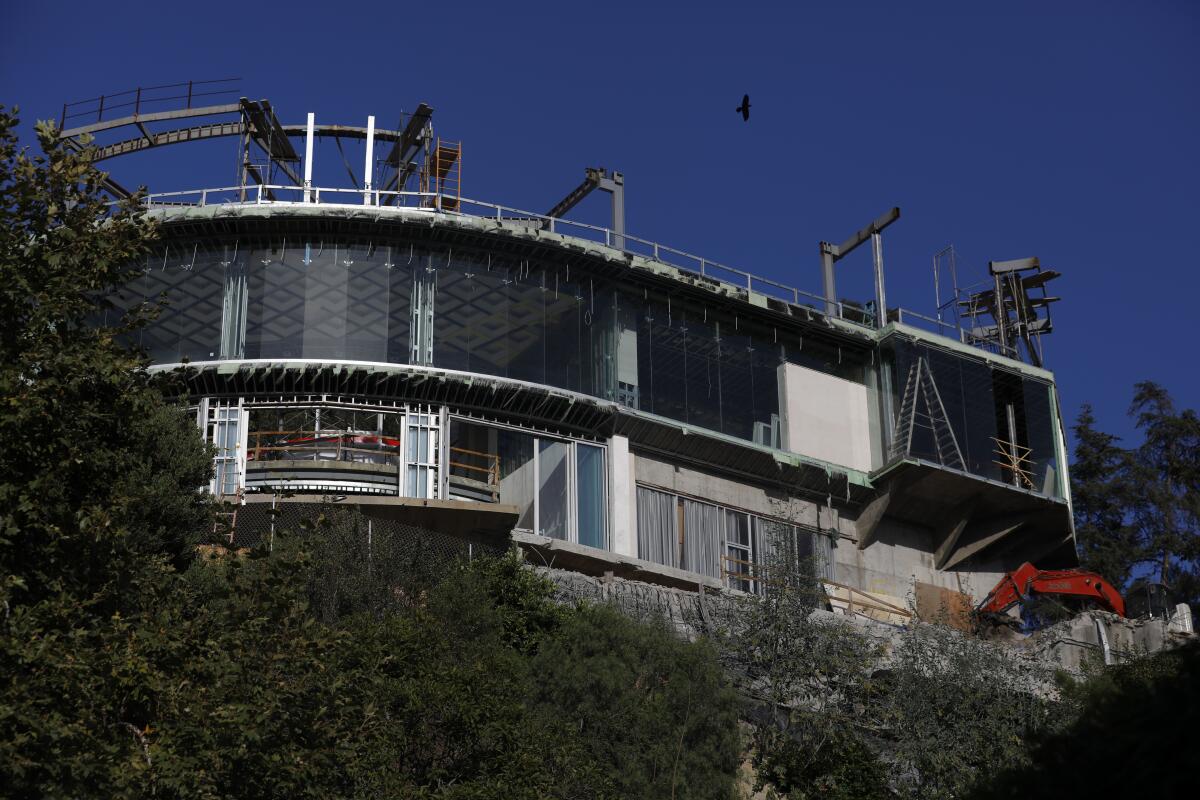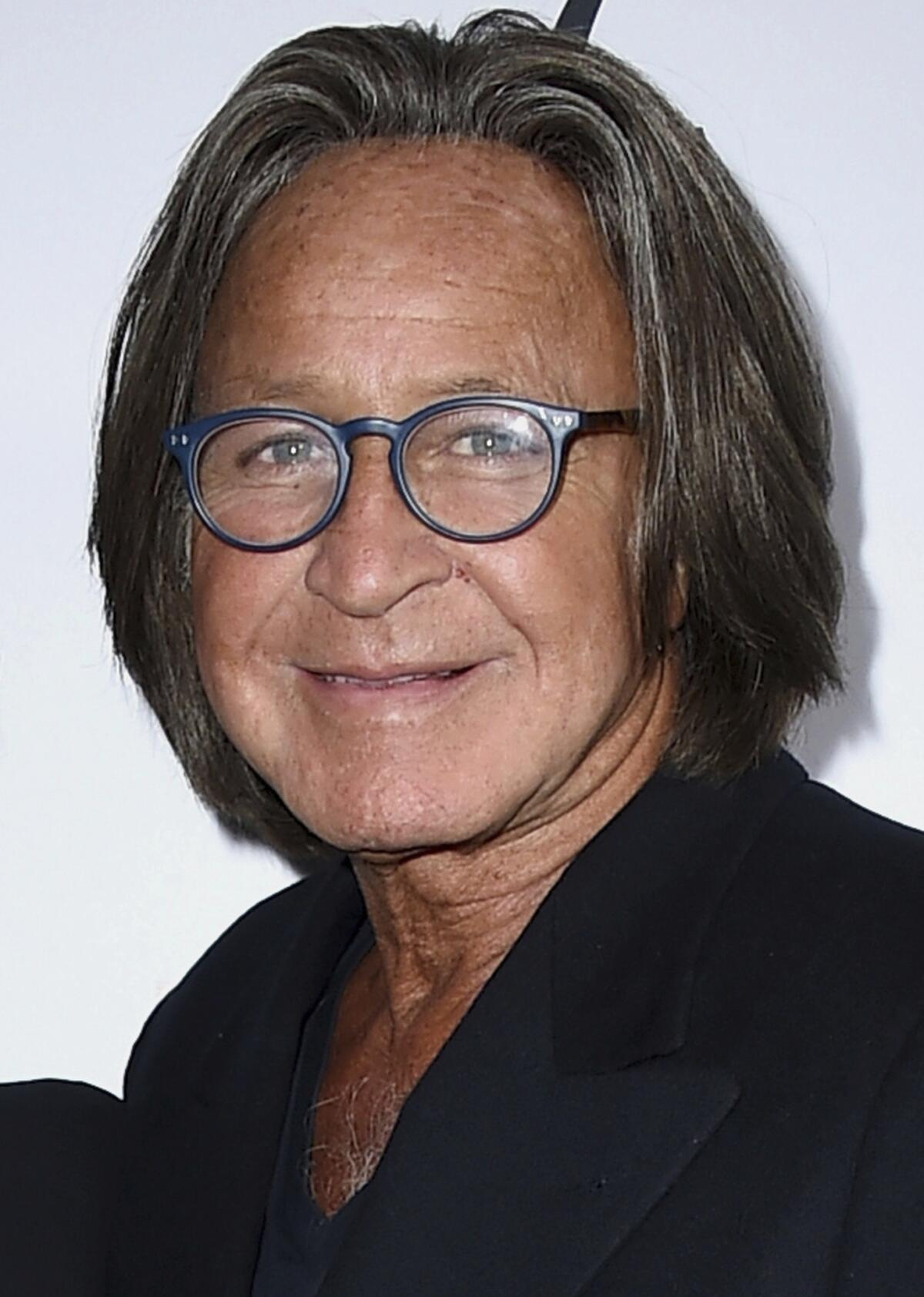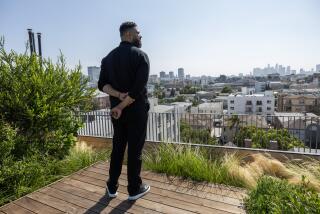Did this celebrity developer perform his community service? Neighbors aren’t so sure

- Share via
Real estate developer Mohamed Hadid has been glimpsed at glitzy galas and elegant lunches, on reality television and in magazines, sometimes squiring his supermodel daughters before the cameras.
But neighbors living below the husk of a massive, unfinished mansion he was building in Bel-Air have been preoccupied with whether he ever made a much less glamorous appearance: doing community service at a Los Angeles church.
Hadid was sentenced to perform hundreds of hours of community service two years ago after he pleaded no contest to criminal charges tied to the construction of that Bel-Air mansion, which prosecutors said was far bigger than allowed. He was also fined and ordered to come up with a plan to stabilize the hillside where the unfinished mansion was perched.
Neighbors have repeatedly questioned whether Hadid followed through and did those 200 hours of community service, pointing to Instagram posts that appeared to show him jetting to Luxembourg and a Daily Mail story in which a woman said she had met up with him in Europe around the same time he was listed as doing his hours.
The question arose yet again this year in a lawsuit lodged by the Bel-Air neighbors against Hadid and the city itself. In a legal declaration in that case, former construction manager Russell Linch made claims about alleged perks for a city inspector on the Bel-Air project and said he believed the structure was unsafe.
Linch also said that Hadid had sent his security guard to a church to do his community service in his place. That guard complained to Linch that he was doing community service for Hadid without pay, Linch said in his declaration. And Linch said that Hadid bought refrigerators and a vacuum cleaner for the church.
Hadid “escaped virtually all punishment in the criminal case” by having someone else do the work, and then appears to have “purchased” the cooperation of people at the church, attorneys for the neighbors wrote in a filing in the civil case.
Hadid is countersuing the neighbors, alleging that one tried to extort him. He has denied the allegations by Linch, whose company has sued Hadid for breach of contract. In June, Hadid’s attorney Bruce Rudman called Linch a “disgruntled former construction manager” and said his declaration was “completely false.”
“He testified differently at his deposition under oath,” Rudman said, adding that Linch “was represented by two attorneys of his own choosing, and paid for by him, when he made directly contradictory statements. He has never been coerced.”
The Times contacted Cochran Avenue Baptist Church, where Hadid was listed as doing his community service. A person who answered the phone said the church could not comment and hung up when asked to identify himself.
Neighbors have repeatedly urged the L.A. city attorney’s office to investigate whether Hadid was out of the country on the dates he was supposed to be doing community service.

Last year, when neighbors raised concerns about Instagram posts that showed him in Europe, an attorney for Hadid said he was posting old photos to convince his daughter that he was out of town so he could surprise her at her birthday party.
To investigate those claims, the city attorney’s office turned to the Assistance League of Los Angeles, which it said had obtained sign-in sheets where Hadid and other participants logged their community service and letters from three people involved with the church program saying that they were not aware of any fraud or forgery.
At a September hearing in the criminal case, supervising Deputy City Atty. Michelle McGinnis said that the court could order Hadid to turn over his passports if the judge wanted, but “there is nowhere for the people to go after a report like this.”
Neighbors again raised the issue after a woman told the Daily Mail that she had met up with Hadid in Europe, pointing to a text message that appeared to place him there on days he was listed as doing his service. At the time, neighbor Beatriz Horacek urged city attorneys to call federal officials to determine whether Hadid was out of the country.
“I do not know, or understand, why the L.A. City Attorney has refused to pick up the phone,” Horacek wrote in an email to McGinnis and City Atty. Mike Feuer last year.
At a hearing earlier this month in criminal court, attorneys for the city and Hadid met with the judge out of public view in her chambers. Court records leave it unclear who called for the private meeting — attorneys for the city and Hadid said the judge herself requested it — and officials said the judge was prohibited from providing any explanation.
“It is customary for such discussions to be held in chambers,” said Rob Wilcox, a spokesman for the city attorney’s office.
Wilcox said that additional evidence, including a copy of a “relevant portion” of Hadid’s passport, had been reviewed and “the court did not signal any interest in continuing this inquiry.” He declined to provide a report from the Los Angeles County Development Authority, an agency that monitors court-ordered community service, which he said had been shown to the judge.
“There was not sufficient evidence to establish a probation violation,” Wilcox said in an email.
Attorney Robert Shapiro, who is representing Hadid, said this month that “the city attorney has looked into it thoroughly and has concluded that there is no evidence whatsoever to support any of these false allegations.” When asked specifically about the trip to Europe reported in the Daily Mail, Shapiro declined to comment further.
Gary Lincenberg, an attorney who is representing the Horaceks and other neighbors in the civil suit, said that “multiple independent sources of evidence” had been presented to the judge casting doubt on whether Hadid did his community service.
Lincenberg, who is not a party to the criminal case, declined to say whether the city had done enough to look into the neighbors’ concerns, noting that “discussions about these issues were held behind closed doors.”
More to Read
Sign up for Essential California
The most important California stories and recommendations in your inbox every morning.
You may occasionally receive promotional content from the Los Angeles Times.











